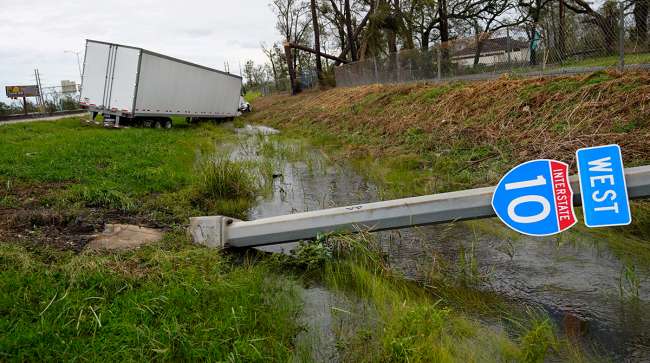Staff Reporter
Experts Stress Teamwork in Response to Natural Disasters

[Stay on top of transportation news: Get TTNews in your inbox.]
As Hurricane Laura was bearing down on the Gulf Coast, disaster preparedness experts discussed how communication and partnerships between the transportation sector and emergency management agencies are vital components of effective responses to natural disasters.
Robert Allen, professor of emergency and security studies at Tulane University in New Orleans, told Transport Topics that it’s key to view emergency situations in terms of capacity and risk assessment, taking into account the procurement of resources and the availability of partners. He encouraged trucking fleets to communicate with U.S. National Guard representatives and law enforcement officers to stay abreast of route accessibility issues.
“You look at what transportation infrastructure you have,” Allen said. “You’ve got to have good knowledge of transportation routes.”
FMCSA has issued an Emergency Declaration for ALABAMA, LOUISIANA, MISSISSIPPI and TEXAS in advance of Hurricanes / Tropical Storms Laura and Marco See: https://t.co/SZYkyZwSdx pic.twitter.com/Ak13QssBBS — FMCSA (@FMCSA) August 26, 2020
As of Aug. 26, the National Hurricane Center reported Hurricane Laura was barreling across the Gulf of Mexico, carrying winds of up to 125 mph. The previous day, it said Post-tropical Cyclone Marco was moving along the Louisiana coast with winds of up to 30 mph.
In response to the storms, officials in Texas, Louisiana and Mississippi issued states of emergency and disaster. The Federal Motor Carrier Safety Administration issued a regional emergency declaration Aug. 24 that pertains to truckers supporting relief efforts in Alabama, Louisiana, Mississippi and Texas. The declaration offers exemption from Parts 390-399 of the Federal Motor Carrier Safety Regulations, which cover hours of service, parts and accessories needed for safe operation, and longer combination vehicles.
John Esparza, president of the Texas Trucking Association, told TT his group has maintained frequent contact with the governor’s office, port authorities and officials from the Federal Emergency Management Agency and the Department of Homeland Security.
Esparza noted storms can prompt ships to disengage from their routes into ports. According to DAT Solutions, the ports of New Orleans and Houston were anticipating closures before Hurricane Laura had made landfall. The Port of Houston processes nearly 70% of all Gulf Coast container traffic.
With major weather events like hurricanes, freight movements tend to follow a common pattern. But within that pattern, circumstances and freight flows change quickly. https://t.co/gyyXjGcwuQ — DAT Freight & Analytics (@LoadBoards) August 25, 2020
Esparza said Hurricane Harvey, which resulted in devastating flooding in 2017, offered some lessons in terms of preparation.
“We’ve already been sending out information to our membership, should we find ourselves in the situation that we have experienced in the past,” Esparza said. “We know it is great to identify and have a network of drivers ready. We learned before that even if you have 100 drivers that you identify, once the storm comes in, you might have 12 or 15 of them that are even available or able to assist.”
That’s where early preparation can help, said Stephen Wong, a doctoral candidate in transportation engineering at University of California-Berkeley.
“Pick up a phone and make sure the supply chain network is good to go. You don’t want to be exchanging business cards during a disaster. You want to be exchanging business cards before a disaster,” said Wong during a webinar hosted by the Eno Center for Transportation on Aug. 26.
Wong noted that agencies, suppliers and trucking companies should maintain contact to ensure that contracts can be fulfilled and critical items, such as personal protective equipment, can be stored. “Build out infrastructure, partnerships and storage for rapid relief,” he said.
Hurricane Laura’s descent coincided with the 15th anniversary of Hurricane Katrina, which struck the Gulf Coast in 2005. Allen, who served in the United Nations Police and the Harbor Police Department associated with the Port of New Orleans, said emergency preparedness practices today compared with 2005 are “night and day,” especially — as it relates to the logistical and supply standpoint — with prepositioning supplies such as water, meals ready to eat and ice, in warehouses.
“My dad told me one time, ‘Sometimes when you tap somebody on the shoulder, you may not get their attention, but if you crack them in the head with a two-by-four, they’re going to listen,’ ” Allen said. “Katrina was our two-by-four, and we listened and we learned a lot from it.”
While Hurricane Laura commanded the headlines, it wasn’t the only recent devastating event. In Iowa, farmers’ crops were ruined by an Aug. 10 derecho with winds that exceeded 100 mph, wiping out fields and grain storage containers. According to Gov. Kim Reynolds’ office, preliminary estimates indicate some 3.5 million acres of corn and 2.5 million acres of soybeans were damaged.
.@CaliforniaDSS and @RedCross are working together so those evacuated from the #CaliforniaFires can safely take shelter during #COVID19.
: @Cal_OESpic.twitter.com/80BBBUZEie — Office of the Governor of California (@CAgovernor) August 27, 2020
According to the California Department of Forestry and Fire Protection, the fires there — created by lightning strikes — have burned more than 1.6 million acres.
Brian Wolshon, an engineering professor at Louisiana State University, noted that natural disasters should be treated as recurring issues.
“I believe these are still looked at as one-off events,” Wolshon told TT of Hurricane Laura. “This hurricane is not a one-off event. It’s going to probably happen next year, if not the year after. What there needs to be is kind of a more holistic, systematic approach and it needs to be more mainstreamed into thinking for transportation.”
Want more news? Listen to today's daily briefing:
Subscribe: Apple Podcasts | Spotify | Amazon Alexa | Google Assistant | More

